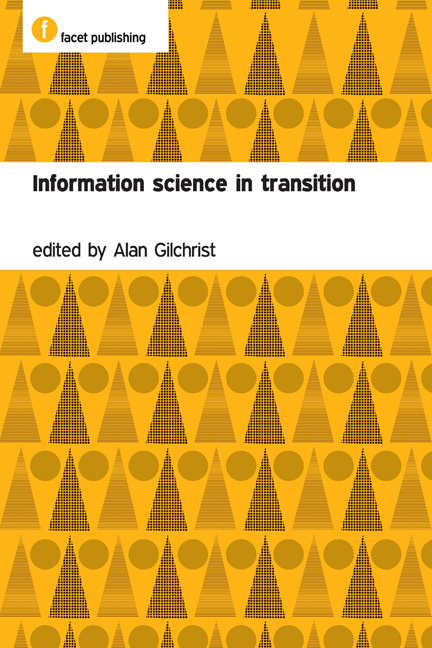Book contents
- Frontmatter
- Contents
- Contributors
- Preface
- Editorial
- Guest Editorial: Meeting the challenge
- 1 Fifty years of UK research in information science
- 2 Smoother pebbles and the shoulders of giants: the developing foundations of information science
- 3 The last 50 years of knowledge organization: a journey through my personal archives
- 4 On the history of evaluation in IR
- 5 The information user: past, present and future
- 6 The sociological turn in information science
- 7 From chemical documentation to chemoinformatics: 50 years of chemical information science
- 8 Health informatics: current issues and challenges
- 9 Social informatics and sociotechnical research – a view from the UK
- 10 The evolution of visual information retrieval
- 11 Information policies: yesterday, today, tomorrow
- 12 The disparity in professional qualifications and progress in information handling: a European perspective
- 13 Electronic scholarly publishing and Open Access
- 14 Social software: fun and games, or business tools?
- 15 Bibliometrics to webometrics
- 16 How I learned to love the Brits
- Index
Editorial
Published online by Cambridge University Press: 08 June 2018
- Frontmatter
- Contents
- Contributors
- Preface
- Editorial
- Guest Editorial: Meeting the challenge
- 1 Fifty years of UK research in information science
- 2 Smoother pebbles and the shoulders of giants: the developing foundations of information science
- 3 The last 50 years of knowledge organization: a journey through my personal archives
- 4 On the history of evaluation in IR
- 5 The information user: past, present and future
- 6 The sociological turn in information science
- 7 From chemical documentation to chemoinformatics: 50 years of chemical information science
- 8 Health informatics: current issues and challenges
- 9 Social informatics and sociotechnical research – a view from the UK
- 10 The evolution of visual information retrieval
- 11 Information policies: yesterday, today, tomorrow
- 12 The disparity in professional qualifications and progress in information handling: a European perspective
- 13 Electronic scholarly publishing and Open Access
- 14 Social software: fun and games, or business tools?
- 15 Bibliometrics to webometrics
- 16 How I learned to love the Brits
- Index
Summary
It is difficult to be precise about the acorn that gave rise to this oak of an issue, but it seems to have been sown in the Strix Committee,1 which is why that Committee is also the Editorial Board of this special issue. A regret was voiced at one of the meetings of this Committee that so little had been done to formally capture the history of information science in the UK. ‘History is more or less bunk’, as the automobile magnate Henry Ford notoriously said. On the other hand, the Spanish philosopher George Santayana proposed that ‘Those who cannot remember the past are condemned to repeat it’. Reflecting on these thoughts last year, it was remembered that 2008 was the 50th Anniversary of the founding of the Institute of Information Scientists in the UK, and that many of the ideas of the earlier information scientists are not only still valid today, but became the foundations upon which later generations have built. Consequently, feeling that it might be worth the effort to capture some insights into advances made in the last 50 years, a number of pre-eminent information scientists were commissioned to write articles on a range of topics reflecting many facets of information science. This issue does not purport to be a history of information science, nor a comprehensive review of each topic. The authors were given only broad guidelines and encouraged to choose their approach and style within them. All the contributions were read by the Editorial Board and, as is usual, all were refereed by peer professionals.
Hopes of consulting an Institute archive for this editorial were dented when it was discovered that the bulk of the material had been pulped when the Institute merged with The Library Association. Whatever may remain appears to be stored at two sites, and is not readily accessible. (This is not the only interesting archive to have gone missing: it seems that all the minutes, correspondence and copies of publications of about 40 years of hugely important work of the Classification Research Group was also lost in a separate misadventure).
- Type
- Chapter
- Information
- Information Science in Transition , pp. xvii - xxPublisher: FacetPrint publication year: 2009



